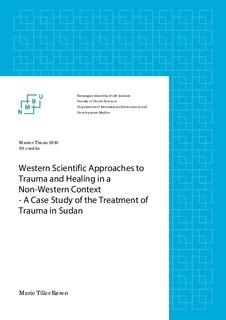Western scientific approaches to trauma and healing in a non-Western context : a case study of the treatment of trauma in Sudan
Abstract
In the aftermath of the Cold War, the United Nation Security Council searched for an
improved approach to peacekeeping. On this request Boutros Boutros-Ghali, the Secretary-
General at that time, put forward the report An Agenda for peace: Preventive diplomacy,
peace-making and peacekeeping. This new approach designed by Boutros-Ghali widened the
scope of the United Nations involvement from the traditional Peacekeeping operations to
Peacebuilding. The general idea was the realization that in order to achieve a positive peace, it
would demand more than what traditional peacekeeping had offered. As a result, the United
Nations and other actors have become more involved in numerous areas concerning the buildup
and reconstruction of post-conflict states. This also includes the psychosocial recovery of
individuals and communities (Summerfield, 1999, Wessells, 2007, Zelizer, 2008). However,
this increasing trend leads to a dilemma put forward by Professor Harry C. Triandis:
“Social psychology is a product of Europe and North America. Almost all that we
know systematically about social behaviour was derived by studying individuals and groups
from those regions of the world. However, 70 percent of the earth’s population lives outside
Europe and North America; in cultures that are quite different from those of the “West”
(Triandis 1994).
Professor Michael G. Wessells points to the same recognition in his paper Post-Conflict
Healing and Reconstruction for Peace: The Power of Social Mobilization where he states:
“Increasingly, the international community views healing as a priority in post-conflict
situations. Although psychosocial intervention in complex emergencies has become
fashionable, this nascent field has a paucity of foundational theory, systematized knowledge
about practice, standards for intervention, and widely accepted benchmarks for evaluation”
(Wessells, 2007, p. 2).
